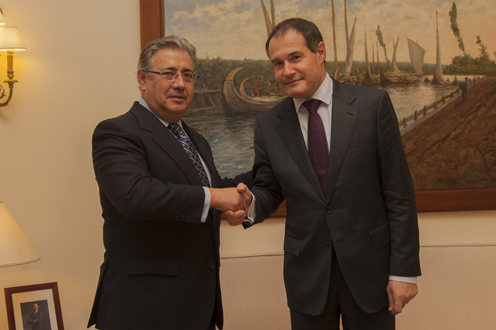Minister for Home Affairs meets with Executive Director of European Border and Coast Guard Agency in Madrid
News - 2016.12.12
During this meeting, Juan Ignacio Zoido conveyed to the Executive Director of Frontex, Fabrice Leggeri, Spain's commitment to Frontex in general and its commitment to the continuity of the Frontex operations headed up by Spain.
In this regard, Juan Ignacio Zoido recalled that in 2015, Spain was the largest contributor in terms of personnel, the fourth largest contributor in terms of both days worked by personnel and technical resources assigned to Frontex operations. In addition, Spanish resources have been deployed in border control operations such as Triton, Poseidon, Project Attica and Focal Points and at the Frontex Situation Centre. Spain also organises and habitually takes part in joint returning flights financed by Frontex.
Furthermore, Spain has already firmed up its participation in the 'rapid intervention teams' of the European Border and Coast Guard Agency with 111 members, selected from the Guardia Civil and the National Police, to form part of a total contingent of 1,500 guards provided by Member States.
Frontex operations headed up by Spain
The Spanish Minister for Home Affairs highlighted that the three operations which Spain heads up each year are "a fine example of our commitment", and underlined Operation Hera deployed in the Atlantic, one of the most experienced and probably the most advanced from the point of view of cooperation with third countries.
Furthermore, Juan Ignacio Zoido explained that Operation Indalo - maritime border surveillance in the Mediterranean - is managing to contain illegal flows from both an operational perspective as well as controlling illegal trafficking, while Operation Minerva - carried out at border posts - contributes noteworthy results each year in terms of the detection of illegal immigrants, false documents, drugs and stolen vehicles.
During this meeting, the Spanish Minister for Home Affairs asked the Executive Director of Frontex for these operations to continue together with an increase in their funding.
Strengthening Frontex and the European Border Guard
Juan Ignacio Zoido pointed out to Fabrice Leggeri that Spain is convinced of the need to control the external borders of the European Union and of the need to strengthen Frontex. In fact, Spain was the only country that presented a memorandum with proposals to strengthen Frontex and provide it with new functions during the first meeting of Task Force Mediterranean held in October 2013, pointed out the Minister for Home Affairs.
The Minister for Home Affairs conveyed to the Executive Director of Frontex that in order for a European Union migratory policy to be effective, it requires three essential participants: the Member States, third countries of origin and transit, and the EU institutions and agencies. "Their concerted actions must be supported with greater commitment, greater resources and more means", declared Juan Ignacio Zoido.
The Minister for Home Affairs explained that based on Spain's experience, "we believe that an essential function of the new agency must be to support our regional neighbours outside of the EU in controlling their borders and in the fight against illegal immigration".
Juan Ignacio Zoido underlined that Spain places great importance on Frontex stepping up its activity and receiving more funding in relation to returning migrants, to raise the current European Union average that stands at 49%.





